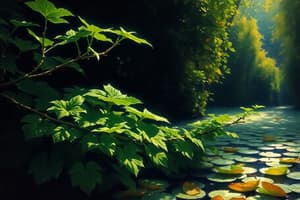Podcast
Questions and Answers
What are organisms that produce their own food called?
What are organisms that produce their own food called?
- Carnivores
- Producers (correct)
- Decomposers
- Consumers
What are organisms that eat living producers and/or other consumers for food called?
What are organisms that eat living producers and/or other consumers for food called?
- Consumers (correct)
- Producers
- Herbivores
- Autotrophs
What is the process called when plants use the sun's energy to convert water and carbon dioxide into sugars?
What is the process called when plants use the sun's energy to convert water and carbon dioxide into sugars?
photosynthesis
What organelles capture the energy from sunlight in plants?
What organelles capture the energy from sunlight in plants?
What is the function of grana in chloroplasts?
What is the function of grana in chloroplasts?
What is the name of the green pigment in plants that absorbs light energy used for photosynthesis?
What is the name of the green pigment in plants that absorbs light energy used for photosynthesis?
What gas do living organisms take in through the lungs to be pumped to body cells?
What gas do living organisms take in through the lungs to be pumped to body cells?
What gas is expelled from the body by the respiratory system?
What gas is expelled from the body by the respiratory system?
Flashcards are hidden until you start studying
Study Notes
Producers and Consumers
- Producers are organisms that create their own food, primarily through photosynthesis.
- Consumers rely on producers or other consumers as their food source.
Photosynthesis
- Photosynthesis is the process by which plants convert sunlight into chemical energy.
- This chemical conversion involves water and carbon dioxide to produce sugars.
Chloroplasts
- Chloroplasts are specialized organelles in plant cells responsible for photosynthesis.
- They capture sunlight's energy and convert it into usable chemical energy.
Grana
- Grana consist of stacked thylakoid membranes found within chloroplasts.
- They play a crucial role in the light-dependent reactions of photosynthesis.
Chlorophyll
- Chlorophyll is the green pigment located within chloroplasts.
- It absorbs light energy needed to initiate photosynthesis.
Oxygen
- Oxygen is a byproduct of photosynthesis, essential for cellular respiration in living organisms.
- It enters the bloodstream through the lungs and is transported to body cells by the heart.
Carbon Dioxide
- Carbon dioxide is a gas that is utilized during photosynthesis and expelled by the respiratory system as waste.
Studying That Suits You
Use AI to generate personalized quizzes and flashcards to suit your learning preferences.




